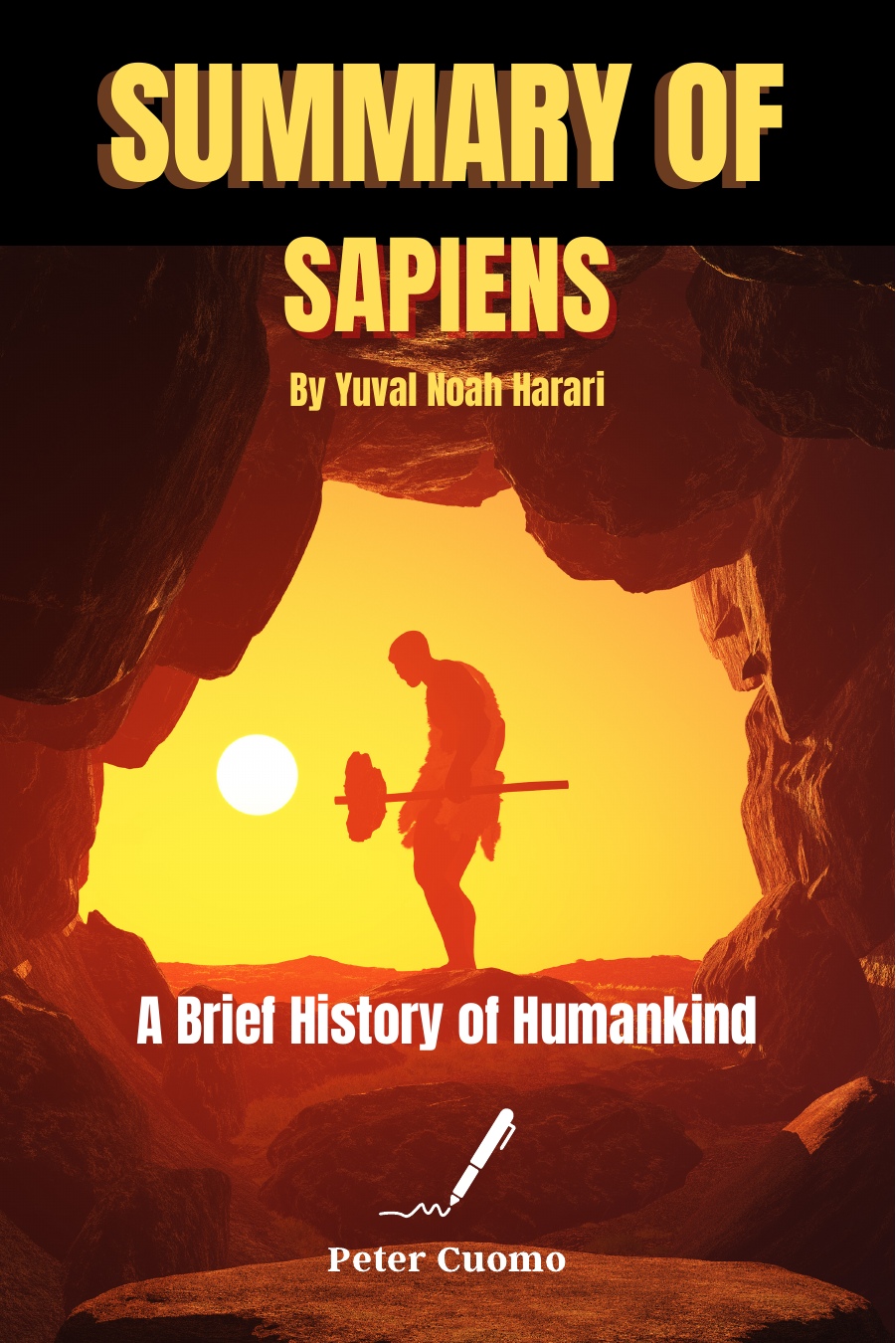Table of Contents
Sapiens Summary
Summary of Sapiens by Yuval Noah Harari – A Brief History of Humankind
A complete summary of Yuval Noah Harari book Sapiens.
A genetic mutation 70,000 years ago gave humans (Homo sapiens) the ability to imagine and believe things that aren’t true, which, Harari argues, had a profound impact on humanity’s ability to cooperate in large groups.
The Cognitive Revolution is one of the key turning points in human history that Harari examines in great detail. There are also references to the Agricultural Revolution (10,000 years ago) and the Industrial Revolution (300 years ago), both of which saw humanity migrate from foraging in the wild to farming in more permanent communities.
Sapiens Book
«Sapiens: A Brief History of Humankind» is a bestselling non-fiction book by Yuval Noah Harari, first published in 2014. The book covers the history of the human species from the emergence of Homo sapiens in Africa to the present day. It explores the major historical events and developments that have shaped human history, including the cognitive, agricultural, scientific and industrial revolutions.
Harari argues that the key to Homo sapiens’ success is our ability to create and believe in shared myths, stories, and concepts such as religion, money, and nation-states, which have allowed us to cooperate in large numbers and build complex societies. He argues that our ability to believe in these myths is what separates us from other animals and has enabled us to dominate the planet.
The book is divided into four parts. The first part, «The Cognitive Revolution,» examines the development of human consciousness and the emergence of Homo sapiens as a dominant species. Harari argues that the ability to create and believe in shared myths was the key to the success of Homo sapiens, enabling us to cooperate in larger groups than other animals. This led to the development of language, art, and religion.
The second part, «The Agricultural Revolution,» looks at the impact of the transition from hunter-gatherer societies to agricultural societies. Harari argues that this transition allowed for the growth of larger populations and the development of cities, but also led to a decline in health and quality of life for many people.
The third part, «The Scientific Revolution,» examines the impact of science and technology on human history, including the development of medicine, the Industrial Revolution, and the emergence of computers and artificial intelligence. Harari argues that these developments have allowed humans to become the dominant species on the planet, but also have the potential to destroy us.
The final part, «The Future of Homo Sapiens,» looks at the possible future of the human species, including the potential impact of genetic engineering, the merging of humans and machines, and the possibility of creating a post-human species.
Throughout the book, Harari challenges many of the common beliefs and assumptions about human history, arguing that our understanding of the past is often based on myths and legends rather than scientific evidence. He also raises thought-provoking questions about the future of humanity, including whether we will continue to dominate the planet or whether our own creations will eventually surpass us.
Overall, «Sapiens» is a fascinating and thought-provoking book that offers a broad and accessible overview of human history. Harari’s writing is engaging and accessible, and he has a knack for making complex concepts and ideas easy to understand. The book is not without its controversies, however, and some critics have accused Harari of oversimplifying or distorting certain aspects of history. Nonetheless, «Sapiens» remains a widely read and influential book that has sparked important conversations about the nature of human history and our place in the world.
If you’re interested in learning more about the fascinating insights and perspectives presented in «Sapiens» by Yuval Noah Harari, but are short on time, then the «Summary of Sapiens» may be the perfect solution for you. This book provides a condensed version of the main ideas and arguments in «Sapiens» in a concise and easy-to-read format, making it a great choice for busy readers who want to get a quick overview of the book’s key takeaways.
By reading the «Summary of Sapiens,» you’ll be able to explore the major themes and historical events that have shaped human history, and gain a deeper understanding of the cognitive, agricultural, scientific, and industrial revolutions that have defined our species. You’ll also learn more about the ways in which shared myths, stories, and concepts have enabled us to cooperate in large numbers and build complex societies.
In addition, the «Summary of Sapiens» offers a glimpse into the potential future of the human species, exploring the impact of genetic engineering, artificial intelligence, and other emerging technologies on our society and the world around us.
If you’re interested in exploring the fascinating ideas presented in «Sapiens,» but don’t have the time to read the full book, then the «Sapiens Summary Book» is an excellent alternative. So why not pick up a copy today and start exploring the incredible story of human history and evolution?


Written by Condensed Books
More From This Category




Surrounded by Liars Review
Click here to get the audiobook for free Book Review: Surrounded by Liars In Surrounded by Liars, Thomas Erikson, a Swedish behavioral expert known for his work on the DISC model, embarks on a fascinating exploration of the complex world of lies. The book...




Surrounded by Liars Review
Click here to get the audiobook for free Book Review: Surrounded by Liars In Surrounded by Liars, Thomas Erikson, a Swedish behavioral expert known for his work on the DISC model, embarks on a fascinating exploration of the complex world of lies. The book...




Surrounded by Liars Review
Click here to get the audiobook for free Book Review: Surrounded by Liars In Surrounded by Liars, Thomas Erikson, a Swedish behavioral expert known for his work on the DISC model, embarks on a fascinating exploration of the complex world of lies. The book...










0 comentarios